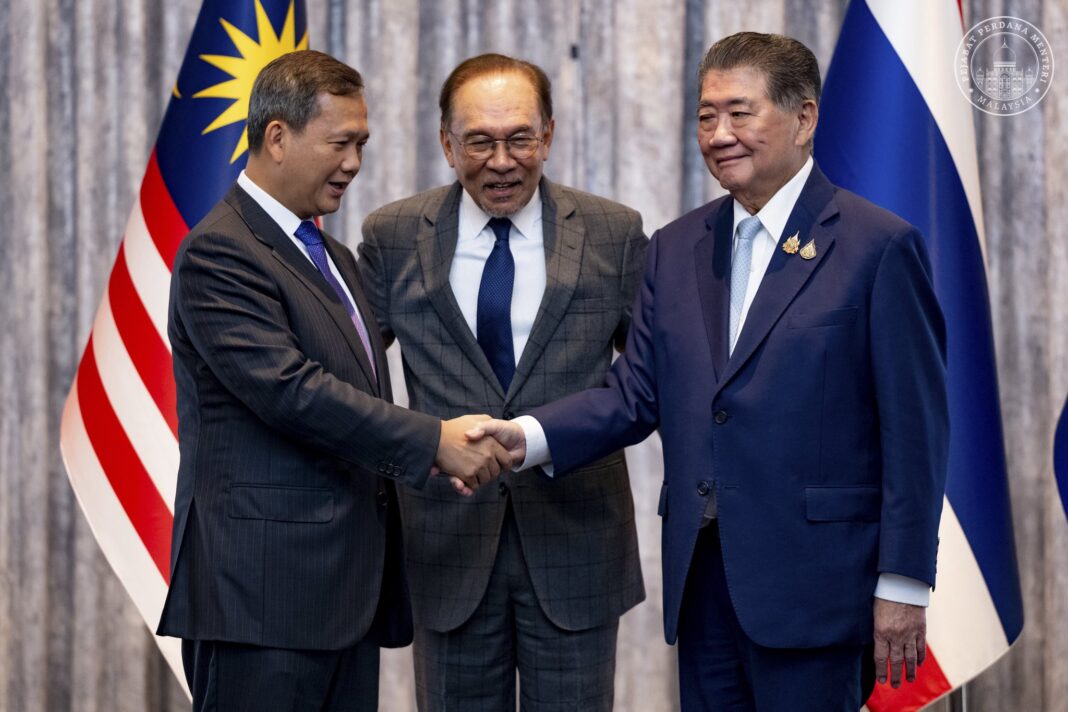- Ceasefire begins at 24:00 Malaysia time on July 28, 2025
- Malaysia chaired the emergency ASEAN summit in Putrajaya
- Trump played a key role by directly urging both sides to pursue peace
- General Border Committee to meet August 4 in Cambodia
- ASEAN to coordinate monitoring mechanism for ceasefire verification
The Big Picture
Thailand and Cambodia have agreed to an immediate and unconditional ceasefire after five days of escalating violence along their shared border. The agreement was reached during a Special Meeting in Putrajaya chaired by Malaysian Prime Minister Dato’ Seri Anwar Ibrahim in his role as ASEAN Chair, according to the official joint press release issued by Malaysia, Cambodia, and Thailand.
The ceasefire takes effect at midnight (24:00 local / 16:00 GMT) on July 28, 2025, marking what leaders called “a vital first step towards de-escalation and the restoration of peace and security.”
Key Terms of the Ceasefire Agreement
According to the joint statement, the agreement includes a roadmap for immediate military coordination, including an informal meeting of regional military commanders scheduled for 07:00 on July 29. A follow-up meeting involving ASEAN defense attachés will be considered if mutually agreed. Cambodia will host a General Border Committee (GBC) meeting on August 4 to advance long-term stabilization.
The parties also agreed to resume direct communication between prime ministers, foreign ministers, and defense ministers. Malaysia, as ASEAN Chair, will coordinate an observer team to oversee implementation and compliance.
Background: A Flashpoint Reignites
The conflict flared on July 24 after a landmine explosion injured Thai soldiers, sparking exchanges of artillery and aerial fire across disputed border zones. As reported by BBC News, at least 35 people were killed and over 260,000 civilians displaced in just five days of fighting.
The Preah Vihear temple region—long contested between the two nations—was a focal point of the clashes. Both sides traded accusations of shelling civilian areas and using banned munitions during the hostilities.
Trump’s Influence Behind the Scenes
The negotiations were co-organized by the United States, with China participating as an observer. The Malaysian Foreign Ministry confirmed that President Donald J. Trump was in direct communication with Cambodian Prime Minister Hun Manet and Thai Acting Prime Minister Phumtham Wechayachai.
According to Virginia Times reporting, Trump emphasized that a U.S.–ASEAN trade agreement would depend on progress toward peace: “We’re not going to make a trade deal unless you settle the war,” he reportedly told both leaders.
Next Steps
Malaysia will consult with other ASEAN member states to expand regional participation in the ceasefire monitoring mechanism. The foreign and defense ministers of all three countries have been instructed to draft detailed verification and reporting procedures.
The final declaration reaffirmed the commitment of all parties to international law, peaceful coexistence, and multilateralism as guiding principles in resolving regional disputes.
Follow Virginia Times for regular news updates. Stay informed with the latest headlines, breaking stories, and in-depth reporting from around the world.
A global media for the latest news, entertainment, music fashion, and more.














